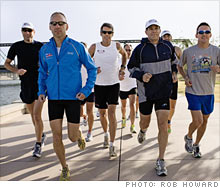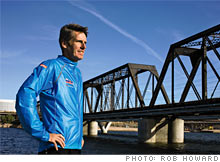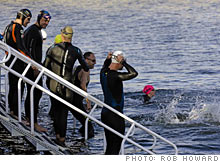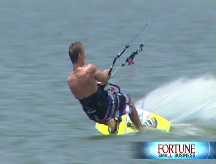The Iron Man
Think triathlons are grueling? Try being the guy who serves the world's most demanding customers - CEOs.
 |
| CEO Challenges owner Ted Kennedy (in white shirt, third from left) and several of his clients loosen their legs at the run course for the 2008 Ironman Arizona. |
 |
| Kennedy training in Tempe, Ariz. |
 |
| CEOs in wet suits, training for the swimming leg of the triathlon. |
(Fortune Small Business) -- About a mile into the run, Ted Kennedy quickens the pace along the dirt trail, squinting hard in the bright Colorado sun. Next to him, CEO Shayne Macherowski briefly hangs on at the faster tempo, then drops behind. Even Kennedy is struggling to keep up with Manny Huerta, a member of the U.S. Olympic development triathlon team, who darts quickly ahead.
The three have come to the Cottontail Trails for an "easy" hour-and-a-half run as part of their swim/bike/marathon preparation for forthcoming Ironman triathlons. Kennedy, owner of a Boulder-based company called CEO Challenges, is not a pro athlete, but he might be the most committed participant in the field. He's as competitive as anyone in endurance sports.
As a student at the University of Guelph, near Toronto, he finished the 1,500-meter run in three minutes and 50 seconds, a school record that still stands 31 years later. He switched to triathlons and duathlons (biking and running) in 1986 and continues to make regular podium finishes in both. Now he also devotes his energy to working with a select group of athletes. We're talking about corporate CEOs, not pro jocks. Kennedy's company, CEO Challenges, enables some of the most competitive people on earth to prove themselves outside the business arena.
In 2001 CEO Challenges shepherded its first 15 clients through an Ironman race. Since then Kennedy has almost doubled his business each year, with 120 CEOs competing around the world for one of 15 slots in the 2008 Ironman World Championship in Kailua-Kona, Hawaii. At stake: the title of World's Fittest CEO (determined by the order in which the CEOs finish).
Kennedy's clients range from Chuck Bengochea, CEO of The HoneyBaked Ham Company of Georgia, to Scott Binder, head of Comcast Colorado. They get to know their fellow overachievers at Kennedy's race dinners. "I thought it would be a bunch of type A super-competitives," Macherowski says, "but it's not. They're really nice people."
Clients like Macherowski expect premium service. "As CEOs, we're all used to being chiefs," he says. "But here Ted's the expert, so we're all Indians."
Macherowski, 42, competed at the St. Croix Half Ironman Triathlon in the spring of 2008, and, as the top CEO finisher, he qualified for one of Kennedy's slots at the 2008 world championships. On this particular June weekend, he has driven to Boulder from his hometown of Steamboat Springs to train with Simon Lessing, a five-time world champion triathlete and official coach to the CEOs. Macherowski is the tanned, buff owner of Evergreen LAND, a real estate development company. (Kennedy put the two in touch.)
The business model is simple. Kennedy targets a dozen particularly high-profile triathlons. He pays in advance to reserve 25 of the 2,000 or so slots in each event so that his clients can sign up at any time during the year. CEOs pay Kennedy not only for the precious slot but also for his help with handling logistics, such as booking hotel rooms, shipping their bikes and equipment, arranging shuttle services and keeping family members updated on race day.
"I've done 148 triathlons," says David Daggett, a 48-year-old attorney who runs his own law firm in Winston-Salem, N.C. "I've been doing them since I was young and had no responsibilities. But now, as I'm trying to manage a business, take care of my family and still compete on race day, Ted's services are invaluable."
The 52-year-old Kennedy started his career in sales and marketing for large consumer-goods companies, including Quaker Oats of Canada. In 1999 he turned down a cushy offer to become president of the Canadian division of Best Foods and instead joined Ironman North America, a startup triathlon company where he worked on 100% commission to sign up new sponsors. "I believed in the growth of the sport," he says earnestly.
Kennedy maintains his Canadian citizenship and accent. He launched CEO Challenges in 2001. Based in Boulder, he works out regularly with many of the area's elite competitors. He fits the profile of his clients - driven company owners with high standards and lofty athletic dreams.
"These are guys who love to set big, hairy goals and have accomplished just about everything they've tried in the past," he says. His clients, who must be company owners, presidents or C-suite executives, pay from $2,500 to $5,000 per event for Kennedy to organize an all-inclusive race weekend, hotel, food entries and events included, at one of about a dozen triathlons worldwide. But it's not just about the vacation: "My whole business is based on identifying who is the best," he says. "Otherwise I'm just a tour company." At the end of the summer, one client is crowned World's Fittest CEO.
The fees cover event and travel costs for CEO Challenges' two full-time employees, Kennedy and daughter Shawna, 24, who also cut her teeth in marketing. They hire two to five contractors to help out on race days. The bulk of the company's annual revenue is derived from sponsorships by AIG (AIG, Fortune 500) Private Client Group (which Kennedy just signed for two more years) and Cigna (CI, Fortune 500). Kennedy intentionally limits the number of sponsors. "I don't want to inundate these guys with logos or messages," he says.
CEO Challenges is riding a global wave of triathlon popularity. According to USA Triathlon (USAT), the sport's governing body, 1.1 million athletes participated in at least one triathlon in 2008. The number of competitors is double that of five years ago, and USAT membership has tripled in the past 10 years. In 2007 USAT sanctioned 55 races in countries around the world, including Brazil and Thailand.
Triathlons vary in length. The shortest is the Sprint, which can be as brief as a 300-meter swim, a 12-mile bike ride and a 3.2-mile run. Olympic Distance is a .93-mile swim, a 24.8-mile bike ride and a 6.2-mile run. A Half Iron is a 1.2-mile swim, a 56-mile bike ride and a 13.1-mile run. The real beast is the Ironman, which begins with a 2.4-mile open-water swim, proceeds to a 112-mile bike ride and concludes with a full 26.2-mile marathon. The first Ironman was held in 1978 in Hawaii, and the world championship still takes place every October in Kailua-Kona.
Kennedy initially focused on the Ironman races, but he has since shifted emphasis to the increasingly popular (and less intimidating) Half Iron and Olympic-distance events.
"People who run companies impress me more than the pros," Kennedy says. "Pros just train, rest and eat. But the pressure on people who run companies is unbelievable. Obviously, one way they handle the pressure is by training, but to do that and work, look after a family, travel - it's amazing."
Macherowski, who started racing in 2003, estimates that he trains from 10 to 20 hours a week, depending on the time of year. "I'll go out at 4 a.m. to get in a 150-mile bike ride," he says.
Usually the only way to sign up for an event such as the Eagleman Ironman race in Cambridge, Md. is to stand in line at the registration table on race day the year before, so Kennedy's reserved slots are popular. And Kennedy provides white-glove service that makes his clients feel like pampered pro athletes. Perks include race check-ins at the pro table, where lines are shorter than those for amateurs; dinners where CEOs can mingle with one another and some of the most famous athletes in the sport; and help from handlers who will drive a family back to the hotel to relax while Dad is out running the marathon, then whisk them back just in time to see him cross the finish line. Even clients who are looking only to finish and have no illusions of being the world's fittest anything appreciate the VIP treatment.
"It brought me to tears the first time I completed the Ironman and my family was on the other side of the finish line," Daggett says. "For families to be at the finish, they usually have to stand out there waiting for hours. There's lots of anxiety, crowds, not knowing where to go or whom to talk to. That's where Ted helps out."
Kennedy's customer service begins with landing the client. "With Shayne, I talked to him for six to eight months," Kennedy says of Macherowski. "That's typical. They call and ask a few questions, think about it, then call again. They're kicking the tires." Patience pays off; Kennedy says the majority of first-time callers eventually become clients.
CEOs tend to find Kennedy by word of mouth or from his ads in triathlon magazines. Once a client decides on a race, Kennedy fills out the registration information, books the hotel and arranges to ship the athlete's bicycle and equipment to the event. Before the race, Kennedy hosts a party where his clients can rub shoulders with big-league professional triathletes. On race day, Kennedy runs around like a mother hen, reassuring families, scheduling shuttles and tracking the progress of his athletes.
During the Ironman World Championship last October, he herded two dozen athletes through a few days of posh prerace events, networking gatherings and advance scouting of the course. On race day he got up at 3:45 a.m. and then worked as usual for the next 21 hours without a break. At midnight he cheered for his last CEO, who was, in fact, the final contestant to cross the finish line before the race cutoff time. Afterward, Kennedy headed back to the hotel to crash.
Macherowski had finished hours earlier, just before 6 p.m., placing third in the CEO Challenge. And he's already thinking about Ironman Canada in August 2009. ![]()
-
The Cheesecake Factory created smaller portions to survive the downturn. Play
-
A breeder of award-winning marijuana seeds is following the money and heading to the U.S. More
-
Most small businesses die within five years, but Amish businesses have a survival rate north of 90%. More
-
The 10 most popular franchise brands over the past decade -- and their failure rates. More
-
These firms are the last left in America making iconic products now in their twilight. More












